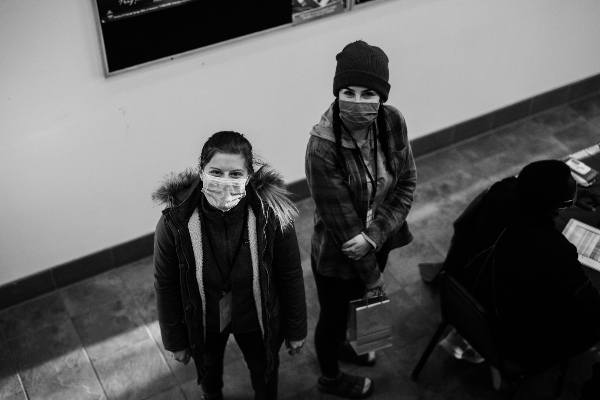On a bustling Saturday morning, I found myself the next lucky candidate to be received by a cashier at our local supermarket. Having had too many verbal wrestling matches with the self-checkout register, I was exceedingly happy to get to speak with a human being. As the cashier began to check out my items, she started some small talk.
“I’m doing well,” I said, behind my mask.
“What?” she said, coming closer to the four-foot-tall plastic wall between us.
“I said, ‘I’m doing well,’” I responded, almost to a shout, as I moved to the single opening in our wall reserved for financial transactions.
Needless to say, I did leave the supermarket with the material things I needed but left feeling disconnected, isolated and misunderstood. Not only did the mask I was wearing make it difficult for others to understand me (even a “smize” wouldn’t do), but also the plastic wall made it impossible to be heard. The only permissible gap between me and the cashier was big enough for us to have a simple transaction of goods. There certainly wasn’t room for there to be any type of personal exchange. Though I was there to be fed with physical food, personal connection was the food for which I longed. I have a feeling that I’m not the only one who has experienced this disappointment in the wake of the pandemic.
This post is not going to address whether or not masks or vaccines are good or bad. On that issue, I encourage you to consult medical experts, your pastor and the teachings of the Church. This post is about the spiritual lessons we can glean from the physical realities we’re experiencing during the pandemic. Through this lens, we can allow for a true examination of our hearts and allow God to move us to greater faith, hope and love as a result.

Wearing an external mask is meant to protect others from taking on any viruses that we may be carrying. How easy is it for us to wear an internal mask in order to protect others from seeing who we truly are in our brokenness and uniqueness? Perfectionism acts as a mask in the form of the ego, in which we try to seem more perfect (in the eyes of the world) than we really are. Though it can come across as pleasing to the culture, which encourages uniformity, perfectionism ultimately chokes the true self that the culture actually needs. Jesus is pleased by our uniqueness and is unafraid of our brokenness. He will never reject us. He made you unrepeatable, completely loveable and necessary to carry out His personal mission for you. Please do not deprive the world of who you truly are in Christ.
How to Take Off the Internal Mask
One simple tool that’s helped me to “unmask” during this pandemic has been to expose my interior to Jesus throughout the day in prayer through the form of ARRR: Acknowledge, Relate, Receive, Respond. First, we acknowledge our emotions and disposition, relate it to Jesus, receive His response and choose to act according to His loving guidance. In giving Jesus our first and most raw self, He will be able to transform us in love. Then He will order our sharing to be appropriate and most authentic to those He places in our lives. This intimacy with God will quench our deepest thirst for connection, transform us and inform us to better approach our friendships authentically and meaningfully.
“Are you vaccinated?” Whether you have chosen to be injected or not, this question is meant to get at an interior disposition towards life: Do you seek to self-protect from suffering, or are you willing to let your suffering be fully cured?
It is good to be protected from the harmful effects of suffering and disease when we can within the means given to us. However, it can be very tempting to live our lives constantly trying to protect ourselves from suffering — whether that be in avoiding a difficult conversation with a loved one, listening to so much noise that we avoid listening to the voice of God or binge-watching YouTube instead of addressing an underlying emotional hurt. These forms of protection can be subtle but over time can cause great damage to the human soul.
As Christians, we have the greatest News to be proclaimed in the culture, especially today: our suffering has meaning. Though we invited suffering into our lives due to our disobedience to God’s plan for us, He loved us so much that He didn’t allow us to suffer the greatest consequence of death. Instead, He innocently took on all of our suffering for us in order that we may be able to live in freedom in this life and fully with Him after death. His Passion, Death and Resurrection are our cure. This means that every experience of our suffering has already been conquered by Christ, and yet He wants to experience it with you right now in union as a friend. We can live in the fruits of our cure by living in the hope of the Resurrection. Will you join me in allowing Jesus into your personal suffering and offering it for the intentions of your loved ones and for the conversion of souls? As we suffer and invite Jesus into our suffering, we console His Heart.

Ironically, what can cause the greatest lasting happiness is to be able to console others in their own suffering. It is so humble to expose our little and big sufferings to others, yet Jesus did it for us first! Let’s not be afraid to live our lives exposed to Him and others as He leads us. Let’s not be afraid to let Him cure us through the very daily mundane experiences of our lives. And let’s not be afraid to live in the hope of the Resurrection — that with every death truly does come new life.
